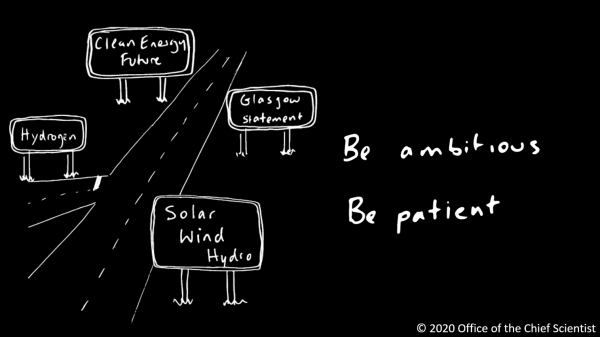Hydrogen opportunities ‘up for grabs’ in the renewable economy
Australia’s Chief Scientist Alan Finkel continued his enthusiastic advocacy of the hydrogen industry when he spoke at the Australian Hydrogen Conference on Monday, telling the online audience that hydrogen has massive potential in transport, especially, but also in industry and domestic use.
Dr Finkel said proponents of hydrogen should be ambitious but patient. While progress might feel slow, it is increasing, he said.
Australia aims to be a major player in the emerging global hydrogen industry by 2030 and beyond.
Dr Finkel, who was introduced to the conference by Australian Hydrogen Council Chief Executive Officer Dr Fiona Simon as a great friend to the hydrogen industry, outlined a suite of opportunities for Australia.
Transport is among the most significant. Dr Finkel said most cars of the future would be battery electric vehicles, but for people without the capacity to recharge overnight at home, fuel-cell hydrogen electric cars would make more sense.
Hyundai has already starting to deliver hydrogen electric vehicles to Switzerland, with 1600 trucks expected to be delivered by 2025. Alstom has introduced a hydrogen-powered electric train in the Netherlands.
The international shipping fleet must switch to near zero emission fuels if it is to meet the International Maritime Organisation goal of cutting emissions by 50% of 2008 levels by 2050, even while increasing fleet numbers, Dr Finkel said. Clean ammonia, made from hydrogen, is likely to be a major fuel source for powering ships, with diesel engines already being modified for the purpose, as well as one of the best ways of transporting renewable energy overseas.
Clean hydrogen also has enormous potential as an export industry for Australia, including to Japan, which aims to import 300,000 tonnes of clean hydrogen a year by 2030. In January, Australia signed a joint statement of cooperation with Japan on hydrogen.
Projects to blend hydrogen into gas networks for domestic use are already underway, and while Dr Finkel said this needs to be done cautiously, at least 10% hydrogen could be included without the need to upgrade domestic appliances.
Green steelmaking could be an enormous market for hydrogen and make a very substantial contribution to decarbonising the global economy, he said. But while pilot plants are being built in Sweden, hydrogen-powered steel-making is a “non-trivial exercise”. It is still unclear whether it will become practical to adapt existing blast furnaces to a completely emissions-free process, but Australia is in a good position for such a shift, given its access to iron oxide, potentially unlimited renewable electricity, and potentially unlimited hydrogen.
There are so many ways that clean hydrogen can contribute to the future economy that it is “all up for grabs”, Dr Finkel said.
He told the conference it is a false dichotomy to present the shift to renewables as a choice between clean energy and a flourishing economy.
“We’re greedy; we want both,” he said.
The Minister for Energy and Emissions Reduction, Angus Taylor, who also gave a keynote speech at the conference, said Australia has all the ingredients needed to be a globally competitive hydrogen producer, including abundant energy resources and huge tracts of land with extensive carbon storage sites.
Mr Taylor referred to the Government’s decision to award Major Project Status to the Asian Renewable Energy Hub in the Pilbara region of Western Australia, which plans a vast array of solar panels and wind turbines, using renewable energy to produce green hydrogen. He also referred to the Hydrogen Energy Supply Chain Pilot Project in Victoria, scheduled to make its first shipment of hydrogen to Japan in March 2021.
Australia has signed an agreement with Germany to test the feasibility of a renewable energy-based hydrogen supply chain between Australia and Germany, and a memorandum of understanding with Singapore to cooperate on the development of low emissions technologies. Mr Taylor pointed to US President-elect Joe Biden’s plans to rapidly commercialise hydrogen, and said last year Australia joined the International Centre for Hydrogen Safety in the US, which would include sending emergency services personnel to work with US on hydrogen safety.
The Australian Hydrogen Conference continues until Thursday.
Dr Finkel led the development Australia’s Hydrogen Strategy, released last year. He also chaired the panel that advised the government on the preparation of the Low Emissions Technology Statement, released in September this year.

